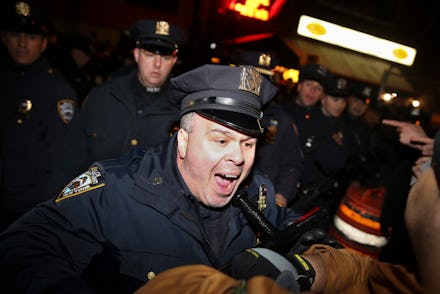One Troubling "Resisting Arrest" Statistic Reveals a Major Problem with Police Departments

How do you tell a good cop from a bad one?
Amid the debate over increasingly dangerous, and in some cases lethal, police tactics, a recent report by WNYC has discovered a disturbing reality about the way that New York's police officers operate.
According to their findings, just 15% of New York Police Department arresting officers generate over 50% of all "resisting arrest" charges, while an even smaller group of just 5% accounted for over 40% of those incidents.
That statistics again: Just 5% of the entire NYPD (roughly 34,500 officers) were involved in over 40% of the city's "resisting arrest" incidents.
In the 51,000 cases that WNYC identified, over 20,000 were reported by that 5% of officers.
Since it's so easy to claim a suspect was "resisting" as a justification to deploy excessive force, officers who regularly claim suspects resisted arrest might be lying. Or perhaps they're being overly aggressive when confronting suspects, leading to unnecessary violence. Either way, something's not quite right here.
With evidence like this, it seems these 5% officers should possibly be flagged as potential future offenders like New York's Officer Daniel Pantaleo and Ferguson, Missouri, Officer Darren Wilson — people who needs to be watched to ensure they're not a threat to the public. Police unions would raise hell over this, but there's ample evidence to suggest most police get along just fine without anyone resisting: Since 2009, around 60% of officers have never claimed a single case of resisting arrest. Something smells fishy.
Of course, the mere fact of reporting "resisting arrest" isn't in itself suspicious, but when so few officers are reporting so many of the department's cases, it's probably a number worth investigating further, especially given what it could imply.
"There's a widespread pattern in American policing where resisting arrest charges are used to sort of cover — and that phrase is used — the officer's use of force," University of Nebraska accountability consultant Sam Walker told WNYC. "Why did the officer use force? Well, the person was resisting arrest."
But this isn't a case of isolated bad apples. It's symptomatic of the NYPD's near-total lack of oversight. The city's police officers have steadfastly refused to commit to any kind of meaningful reform, thus ensuring the only change that occurs will have to be foisted upon them from the outside. For example, the defeat of stop and frisk required immense public pressure, countless lawsuits and a mayor who ran on a ticket explicitly promising to end it.
However, this type of oversight probably isn't going anywhere anytime soon. In a recent Washington Post op-ed, Redditt Hudson, a former police officer who works for the NAACP and chairs the board of the Ethics Project, explained how bad racism really is in certain police forces, and why it will never change, specifically mentioning the problems associated with "excessive force." He writes:
Even when officers get caught, they know they'll be investigated by their friends, and put on paid leave. My colleagues would laughingly refer to this as a free vacation. It isn't a punishment. And excessive force is almost always deemed acceptable in our courts and among our grand juries. Prosecutors are tight with law enforcement, and share the same values and ideas.
The Department of Justice is investigating police departments all across the country, proving misconduct in cities from Cleveland to Albuquerque. Unfortunately, oversight is lax — the FBI doesn't even have reliable data on how many people police departments kill, let alone arrest on trumped-up charges. These bad apples are likely all around the country, and no one who can do anything about it is paying attention.
h/t Vox
Correction: Dec. 8, 2014